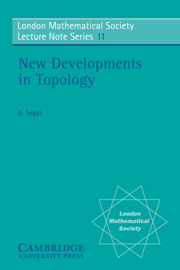Book contents
- Frontmatter
- Contents
- Preface
- 1 Operations of the nth kind in K-theory, and what we don't know about RP∞
- 2 The Pontrjagin dual of a spectrum
- 3 Algebraic K-theory of non-additive functors of finite degree
- 4 Dyer-Lashof operations in K-theory
- 5 Homotopy homomorphisms of Lie groups
- 6 On spherical fiber bundles and their PL reductions
- 7 E∞ spaces, group completions, and permutative categories
- 8 Higher K-theory for categories with exact sequences
- 9 Operations in stable homotopy theory
- 10 Equivariant algebraic K-theory
- 11 On rank 2 mod odd H-spaces
11 - On rank 2 mod odd H-spaces
Published online by Cambridge University Press: 05 April 2013
- Frontmatter
- Contents
- Preface
- 1 Operations of the nth kind in K-theory, and what we don't know about RP∞
- 2 The Pontrjagin dual of a spectrum
- 3 Algebraic K-theory of non-additive functors of finite degree
- 4 Dyer-Lashof operations in K-theory
- 5 Homotopy homomorphisms of Lie groups
- 6 On spherical fiber bundles and their PL reductions
- 7 E∞ spaces, group completions, and permutative categories
- 8 Higher K-theory for categories with exact sequences
- 9 Operations in stable homotopy theory
- 10 Equivariant algebraic K-theory
- 11 On rank 2 mod odd H-spaces
Summary
Introduction. In [1], [2] and [7] the classification of rank 2 H-spaces was practically completed. The fact that there are only finitely many (homotopy classes of) such spaces is due primarily to the fact that the number of possible mod-2 cohomoloty rings of such spaces is very limited as the Steenrod algebra (as well as higher order operations) act on such rings in a very definite way.
In [4] it was shown that modulo odd primes non classical mod-p H-spaces of rank 2 exist: i. e. there exists an H-space X such that H*(X, ZP) is an exterior algebra on two generators. (Modulo odd primes we consider odd dimensional spheres as classical H-spaces.)
Consequently, the mod odd classification of mod odd rank 2 H-spaces is yet to be considered. Its implication for the classification problem of finite CW complexes is obvious, as the corollary to Theorem A illustrates.
Throughout this paper let n and m be fixed odd integers such that 3 ≤ n ≤ m. As Sn × Sm is a mod odd H-space there are mod odd H-spaces of type (n, m) for any given such pair, and the classification has to be carried out separately for each such pair.
- Type
- Chapter
- Information
- New Developments in Topology , pp. 119 - 128Publisher: Cambridge University PressPrint publication year: 1974
- 1
- Cited by

